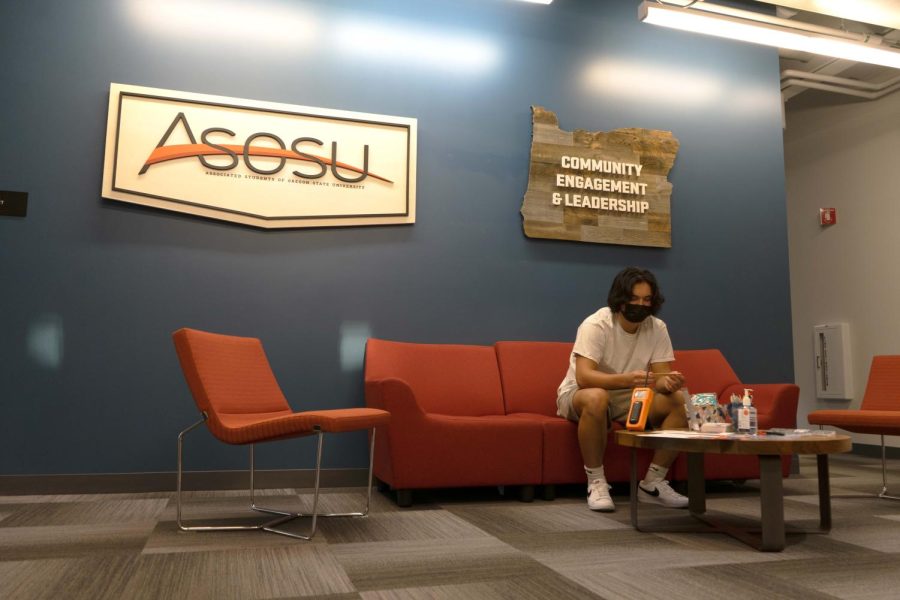ASOSU Congress concludes deliberations on 2022-23 student fees
Marketing student Micah Grobey sits in the Associated Students of Oregon State University office on the second floor of the Student Experience Center. The ASOSU Congress has finished voting on the student fees for the 2022-23 fiscal year and now the Board of Trustees must approve the proposed budgets.
February 14, 2022
The allocation of roughly $26 million of student fees has been sorted and approved by the Oregon State University student government and now awaits the board of trustees’ final approval.
In December 2021, the Associated Students of Oregon State University’s Student Fee Committee voted on operating budgets and decision packages for the 2022-23 fiscal year. The SFC also voted to increase the minimum wage of all student fee funded units to $15 an hour.
Since returning from the 2022 winter break, the ASOSU Congress has heard from all eight fee-funded units—Student Experience and Engagement (including diversity and cultural engagement), Memorial Union, ASOSU, Recreational Sports, Intercollegiate Athletics, Family Resource Center, Human Services Resource Center and Performing Arts Board—to conduct their own vote on the proposed budgets for 2022-23 fiscal year that were passed by the SFC in December 2021.
Orange Media Network, which The Daily Barometer is a part of, is funded by SEE and will be impacted by fee decisions.
The operating budgets and decision packages for each of the eight units were passed by the ASOSU Congress to maintain regular operations and program maintenance in the next year.
The budget of ASOSU itself, as well as the proposal and approval process, has shifted this year, moving from a two-week review and discussion to six weeks in this cycle of deliberations.
According to Luc Schnell, a fourth-year student and ASOSU speaker of the house, the change in the process was made to test what works best, allowing the committee to carefully review each proposal package.
“That process took a lot longer than we originally hoped, but we eventually got there,” Schnell said.
Schnell said the decision was also made to avoid overstressing and underpaying ASOSU members as a continuation of this year’s leadership goals to prioritize student needs, including providing accurate compensation for them.
Within ASOSU’s budget, they have moved toward restoring pre-pandemic funding levels, allowing programs that have been on hold to return and gain more student support.
Included in the decision packages approved by the ASOSU Congress was a $15 minimum base pay for student employees of fee-funded units, as well as a change to summer term fees.
According to Schnell, much of what is passed in this cycle reflects ASOSU’s goals to accurately use fees for the most important student needs.
“In the past, students have been charged a different rate if they attended summer classes, and students who attend fall, winter and spring but don’t attend summer classes are paying a little more than operating costs of fall, winter and spring to help subsidize the cost not met over summer,” Schnell explained. “But we have removed the summer fee and now a flat fee will be charged.”
This change in billing takes effect this summer and will allow students who do not take summer classes to still utilize campus resources in summer without paying extra in the fall, winter and spring terms.
“This is just a way to more equally and directly charge students for the services and access for the amounts they have paid for their fees,” Schnell said.
The $15 minimum base pay will impact roughly 2,000 student employees, according to Schnell, and has been a major goal of the ASOSU executive team since their campaign.
The final decision on the bill now awaits the board of trustees’ approval, as do all of the other proposed budgets.











































































































